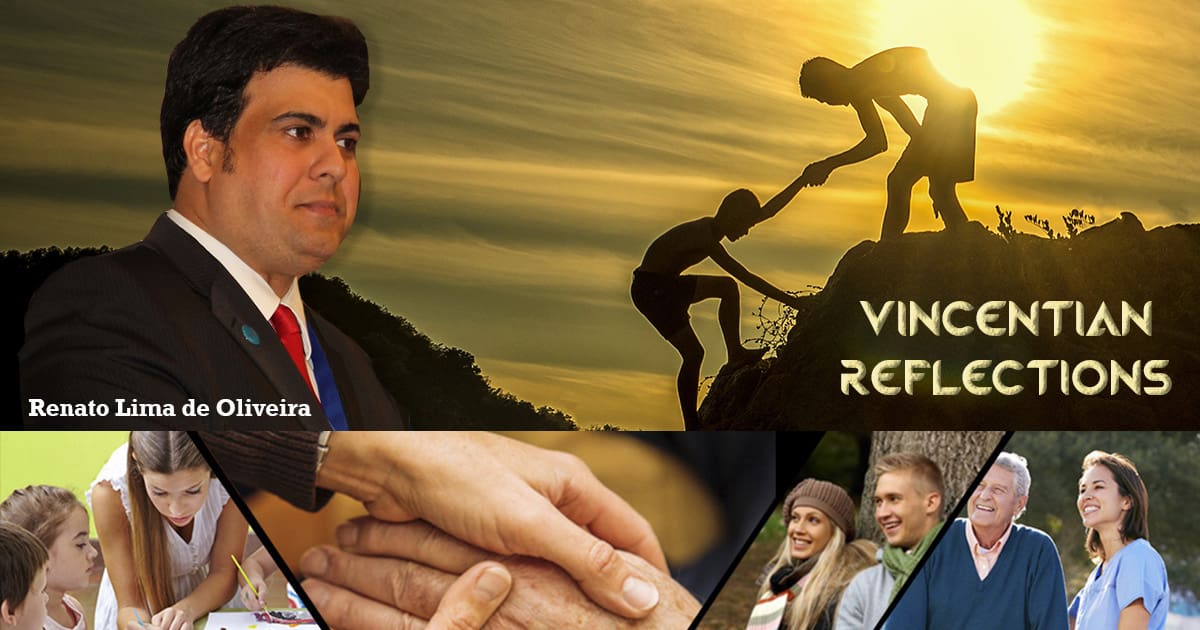One of the greatest challenges for the Conferences of the Society of Saint Vincent de Paul is to know how to combine the distribution of material goods with effective action that enables families in need to live with dignity, to become protagonists in their development and to enable them to overcome the barriers of poverty and misery through the sweat of their work and the power of God.
This reflection leads to another deeper and evangelical reflection on the reality of charity, the greatest God-given gift and the reason for our existence as the Society of Saint Vincent de Paul. Charity is everything for us as members of this Society. If we are not charitable (generous) in the manner that we act, then we will fall into the simple routine of philanthropy and/or providing material assistance … and nothing more. In reality, our charity symbolizes a boundless love that demands a holistic vision of the human person (a vision that respect his/her history and hopes)
In addition to the traditional help that we, as members of the Society and the worldwide Vincentian Family, provide to people in need (food baskets, construction materials, medicine, clothing, blankets, etc.), it is most necessary that the members act in an innovative way in the sense of seeking «shortcuts» that will enable people to escape the chains of poverty. We have sufficient competence and knowledge to suggest alternatives to the people whom we serve.
A suggestion that many Conferences might find useful, especially those located in small cities, is the creation of Special Works Committee which can enhance our Vincentian ministry. In larger cities the Special Works Committee can be composed of members from various conferences … in other words, a group of conferences from the same area comes together and maintains a work of this nature for the benefit of those men and women who are poor.
With regard to the Councils of the Society, why should the headquarters of a Particular (or Zone) Council be idle for the greater part of the year (perhaps just used for regular monthly meetings). Couldn’t we do more?
Another suggestion is the creation of special works, for example, in a nursing home. Wouldn’t it be interesting to put in place a sewing club or a manual arts club that would take advantage of the experience of the elderly and establish bonds between them and younger people? Another example is a school: wouldn’t it be wonderful to create a conference formed by the parents and the teachers of the children.
It is obvious then that the Conferences and Councils of the Society have adequate conditions for effective action on behalf of those in need. Indeed, the Office of the Vincentian Family has exhorted us and all the members of the Family to focus on Systemic Change Projects. We should remember the words of Saint Vincent: Love is inventive to infinity [1]
An insight for further reflection: the charity that we offer to those in need must go beyond material assistance and should involve true human promotion. How has the conference been involved in human promotion?
Note:
[1] Vincent de Paul, Correspondence, Conference, Documents, translators: Helen Marie Law, DC (Vol. 1), Marie Poole, DC (Vol. 1-14), James King, CM (Vol. 1-2), Francis Germovnik, CM (Vol. 1-8, 13a-13b [Latin]), Esther Cavanagh, DC (Vol. 2), Ann Mary Dougherty, DC (Vol. 12); Evelyne Franc, DC (Vol. 13a-13b), Thomas Davitt, CM (Vol. 13a-13b [Latin]), Glennon E. Figge, CM (Vol. 13a-13b [Latin]), John G. Nugent, CM (Vol. 13a-13b [Latin]), Andrew Spellman, CM (Vol. 13a-13b [Latin]); edited: Jacqueline Kilar, DC (Vol. 1-2), Marie Poole, DC (Vol. 2-13b), Julia Denton, DC [editor-in-chief] (Vol. 3-10, 13a-13b), Paule Freeburg, DC (Vol. 3), Mirian Hamway, DC (Vol. 3), Elinor Hartman, DC (Vol. 4-10, 13a-13b), Ellen Van Zandt, DC (Vol. 9-13b), Ann Mary Dougherty (Vol. 11-12 and 14); annotated: John W. Carven, CM (Vol. 1-13b); New City Press, Brooklyn and Hyde Park, 1985-2014, volume XI, p. 131. It should be noted that those words that are often cited in the Vincentian Family are intended to encourage us to be creative in our pastoral ministry as we respond to the new forms of poverty. We are also to be creative in our formation programs and in our struggle to eliminate the root causes of poverty. It should also be noted that these words were first used by Vincent in reference to the Eucharist: Vincent, in speaking to a dying brother in 1645m exhorted him to think of God’s mercy. After describing many of the signs of God’s tender love, he told the brother that Jesus, foreseeing his death, did not want to leave his followers alone. He feared that in his absence their hearts would grow cold. And so, he tells the brother, “since love is creative even to infinity … he instituted this venerable sacrament which serves as food and drink for us … Because love is eager to do everything it can, he so willed it (Robert P. Maloney, “Love is Creative Even to Infinity: On the Eucharist in the Vincentian Tradition” in Vincentiana, Vol. XLVII, #2 [March-April 2003], p. 107).
Written by: Renato Lima de Oliveira
16th General President of the Society of Saint Vincent de Paul
Translated: Charles T. Plock, CM
Eastern Province, USA








0 Comments